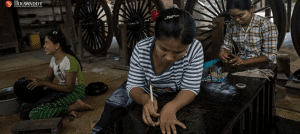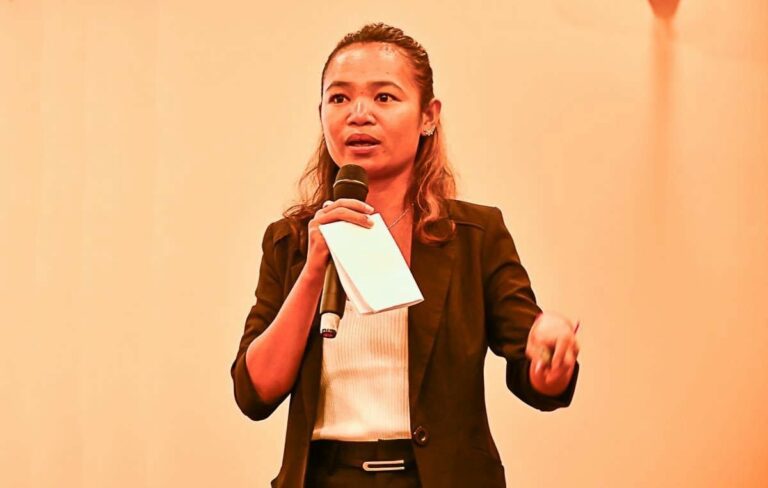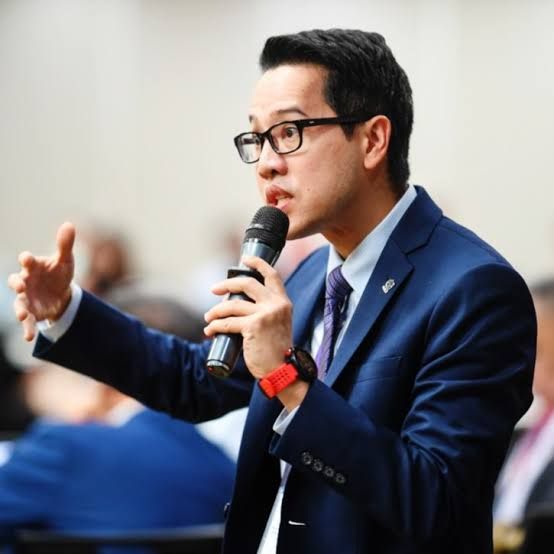
Photo: The Irrawaddy / Aung Kyaw Htet
Myanmar’s small and medium-sized enterprises (SMEs) affected by the pandemic need the government to relax its COVID-19 loan policies in order to help businesses thrive, according to industry representatives.
Speaking with State Counselor Daw Aung San Suu Kyi on Tuesday, Daw Win Win Tint, managing director of retail giant City Mart Holdings, said small businesses are facing difficulties around lending rules and regulations for the government’s loan program.
Much of the government’s COVID-19 relief requires that businesses repay loans in just one year.
“Those rules and regulations are out of reach for retail businesses. I would like to request [the government] consider it,” Daw Win Win Tint said.
Myanmar State Counselor Daw Aung San Suu Kyi held a talk on Tuesday about the effects of COVID-19 on trade with Daw Win Win Tint, Deputy Minister of Commerce U Aung Htoo and Daw Thet Su Htay, owner of a small local business that makes natural plum and tamarind syrup.
Daw Thet Su Htay said local SMEs are badly affected by COVID-19, facing layoffs and a significant decline in income. However, she said they don’t apply for the government loan program due to the short loan repayment period stipulated by the program.
“Because we don’t know when businesses will be able to operate normally, the loan repayment period is too short,” said Daw Thet Su Htay.
“[Business owners] are concerned: what if their business can’t operate well? The loan [deadline] would add an extra burden for them. Because of these concerns, businesses are not applying for loans [from the government],” she added.
In late March, the government set up a 100-billion-kyat (US$71.3 million) COVID-19 fund for local businesses, particularly SMEs and the garment, manufacturing and hotel-and-tourism sectors. The fund offers one-year loans at a 1 percent interest rate. The government’s COVID-19 Economic Relief Plan (CERP) also committed to increasing the size of the fund to 200-500 billion kyats, depending on the market response, by the end of 2020.
In June, the Japan International Cooperation Agency (JICA) also announced emergency loans worth 5 billion yen (around US$46 million) to assist businesses in Myanmar hit by the coronavirus pandemic. JICA said the loans will be low-interest and will support SMEs to continue operations despite the severe economic situation caused by COVID-19.
But Daw Thet Su Htay said businesses are also facing difficulties with the criteria for Japan’s loan program, especially around the collateral it requires from loan applicants.
“There are a lot of criteria, so it is totally inaccessible for small businesses,” she said.
She stressed that many small businesses are unable to submit loan applications as they do not have an ownership certificate for valuable property.
Since late January, the COVID-19 outbreak has hit Myanmar’s tourism, border trade and export sectors, causing massive losses for producers, exporters and workers. Airlines and hotels in the country have suffered losses due to travel restrictions.
Daw Win Win Tint said even though businesses for essential products run normally, other non-food retailers, including clothing businesses, have been badly hit by the pandemic.
She said that despite some COVID-19 restrictions ending, the demand for non-food products has continued to decline. “[Businesses selling non-food products] are facing a lot of difficulties. We have seen sales decline by 80 percent compared with last year.”
A nationwide survey by the Asia Foundation on the impacts of COVID-19 on Myanmar businesses also revealed that nearly two-thirds of businesses expect to face cash flow problems, putting their survival at risk as government emergency loans have reached only a fraction of businesses so far.
Daw Aung San Suu Kyi said Tuesday that the government is trying to keep trade alive as much as possible, but the government has to consider the risks of COVID-19.
“We want to run all ‘business as usual’ but on the other hand, we have to be aware all the time that the next wave [of COVID-19] could hit us badly if we make rash decisions [to ease restrictions],” she said.
She said she wanted to assure SMEs that the government will consider their situation and make amendments to the loan program to ease their difficulties in obtaining loans. “In terms of loans, [the government] will look into it—to make things easy,” the State Counselor said.
Read the full article at The Irrawaddy: https://www.irrawaddy.com/news/burma/myanmar-smes-urge-suu-kyi-ease-covid-19-loan-policies.html





